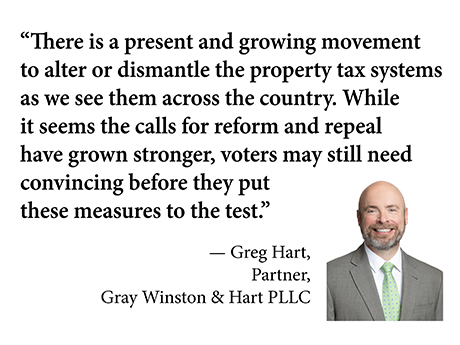
By Greg Hart, partner, Gray Winston & Hart PLLC
The property tax system in the United States, which traces its roots to colonial America, has long been the life blood of local government finance. Used to fund schools, infrastructure and vital municipal services, it is also a system fraught with controversy and mounting calls for reform.
Over the past decade, as assessments rose and local governments grappled with budgetary needs, a perfect storm has slowly but steadily been brewing. Rising home values, stagnant wages and shifting demographics have combined to disproportionately increase property tax bills for many families and small businesses. In many large metropolitan areas, annual increases have outpaced inflation.
For commercial property owners, whose collective burden grows as communities cap valuations or otherwise shield segments of the residential tax base, many assessments still reflect bygone notions of revenue potential from properties that now struggle with obsolescence. As a result, the property tax burden on commercial and residential property owners alike continues to grow.
Advocacy groups often decry examples of individuals forced to sell their homes due to unaffordable taxes and are calling for meaningful property tax reform.
Taxation is a delicate balancing act, however. Each state is tasked with determining whether or not it can realistically fund schools, police and other essential services if it significantly reduces or eliminates property taxes. After all, property taxes typically account for more than 70 percent of local government tax revenue nationwide, according to the Tax Foundation.
Yet, unlike income or sales tax, property taxes do not always reflect the owner’s ability to pay, which becomes especially problematic in booming housing markets with high tax rates.
Ballot Measures in 2024
In retrospect, 2024 marked a very significant year for property tax reform. In 2024, various states responded to mounting concerns with ballot measures, legislative overhauls and, in some cases, proposals to outright repeal tax structure.
The 2024 election cycle featured an unusually high number of property tax ballot measures, and some states are already undergoing reform efforts. Voters in at least seven states weighed in on changes to their property tax systems, according to the National Conference of State Legislatures. Proposed changes ranged from relatively small, targeted reforms to outright repeal, achieving varying degrees of success.
Seven states proposed legislation last year to reduce or limit property tax burdens. Lawmakers in Wyoming, which experienced a significant influx of residents during the pandemic and a surge in purchases of rental, vacation and second homes, proposed a distinction between owner-occupied housing versus rental or non-primary residences.
Virginia and New Mexico extended property tax protections for veterans, while Georgia followed in the footsteps of many other states by proposing a homestead exemption for owners’ primary residences. Florida, likely responding to charges that property taxes ignore the owner’s ability to pay, proposed allowing an adjustment to the homestead exemption according to annual inflation.
Arizona voters approved a system tying property taxes to local efforts to mitigate homelessness. In municipalities not enforcing laws against illegal camping, loitering, panhandling, public urination, public consumption of alcohol and possession of illegal substances, property owners can apply for property tax refunds.
Colorado proposed and later withdrew an initiative for a 4 percent cap on tax revenue increases that would have required voter approval to exceed the cap. The state now caps property tax increases by local governments at 5.5 percent per year. There was also a strong push to significantly lower the assessment rates on commercial and residential property. This ended in a legislative compromise that lowered the rate, but not as low as initially proposed.
Unlike the specific, targeted changes attempted by the states above, North Dakota in 2024 put forth Measure 4, a bill that proposed the complete repeal of property taxes. Opponents of the measure warned that such a move would cripple local governments, with some experts projecting a $1.3 billion loss in revenue. North Dakotans rejected the bill, leading to renewed legislative efforts to severely hobble the property tax system in 2025.
Efforts Continue
The push for property tax relief has intensified in 2025, with more states going beyond targeted exemptions and seeking to repeal property taxes outright.
Florida is making a push to abolish property taxes despite the absence of a state income tax, which makes it more reliant on property taxes than many other states. Florida would most likely have to offset the lost revenue by increasing the 6 percent sales tax, potentially doubling it to 12 percent.
In Pennsylvania, there is a push to place a state constitutional amendment on this November’s ballot that would outlaw all property taxes there by July 1, 2030. The state would need an increase in sales tax and income tax to cover the shortfall.
After North Dakota’s failed attempt to achieve tax relief at the ballot box in 2024, proponents now seek to create new tax credits and to cap tax increases at 3 percent year over year, covering the shortfall with the state’s oil-rich Legacy Fund.
The focus in Texas is on expanding exemptions rather than fully dismantling property taxes. Proposed changes during the special legislative session include exemptions for the elderly and/or disabled and expanding homestead protections up to $140,000, as well as new exemptions related to business assets, animal feed, improvements to fire-damaged homesteads and border infrastructure value.
Texas is also putting forth a law that would require an election to be held if a taxing entity were to raise its tax rate by 2.5 percent or more year over year, a more stringent cap than the current 3.5 percent cap.
From North Dakota’s repeated repeal attempts to Pennsylvania’s proposed constitutional amendment, and from Florida’s investigation of repeal feasibility to Texas’s additional legislative sessions to address property taxes, it seems clear that there is a present and growing movement to alter or dismantle the property tax systems as we see them across the country.
While it seems the calls for reform and repeal have grown stronger, voters may still need convincing before they put these measures to the test.
Greg Hart is a partner at Austin, Texas, law firm Gray Winston & Hart PLLC. The firm is the Texas member of American Property Tax Counsel, the national affiliation of property tax attorneys. Contact Greg at greg@graywinston.com.






